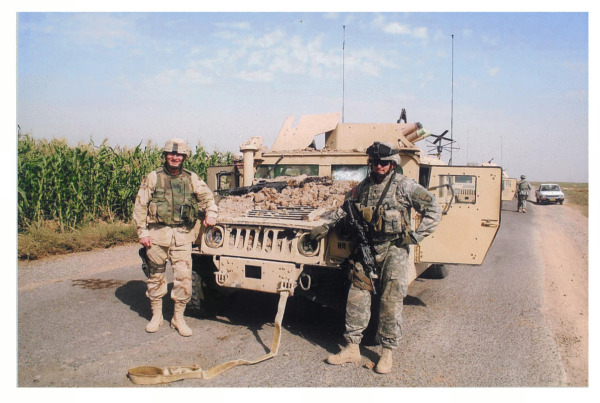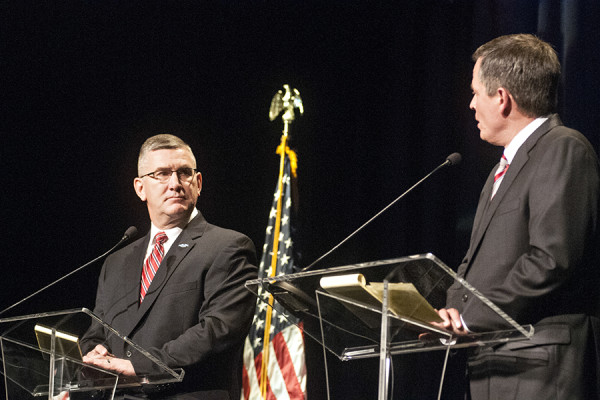Floating on the North Fork of the Flathead River, U.S. Sen. John Walsh slowly guides a raft downstream. Set against a backdrop of towering mountains, the moment has all of the metrics of a perfect campaign commercial or staged photo opportunity. But today, those taking photos are only a staff member and a few river guides.
It would be different if Walsh were still running for U.S. Senate. A fleet of aides might be hurrying the guides to move along so the senator could hustle off to his next campaign event. A raft of reporters and photographers would be jockeying for a perfect position. Perhaps a Republican tracker, guiding another boat, would be training a video camera on Walsh, just like a tracker had a few weeks earlier, filming New Hampshire Senate candidate Scott Brown.
But there’s none of that.
When Walsh chats with the only reporter who came along for the trip, arranged to highlight efforts to protect the North Fork, he doesn’t stray far from the campaign rhetoric he had memorized months before – “doing right for our veterans” and how “polarization is what’s dividing us.” But after awhile, the exchange veers toward hiking and fishing, local microbrews and the previous night’s baseball game. Normal stuff.
During a lull in the conversation, Walsh’s wife, Janet, looks around and says, “It’s so quiet here.”
Montana Democrats thought they had the perfect U.S. Senate candidate in John Walsh, a decorated veteran who served his country in the Montana National Guard for more than three decades. Chances for victory improved when Gov. Steve Bullock appointed Walsh to the U.S. Senate to replace retiring Max Baucus, providing the 53-year-old Butte native the power of incumbency.
Walsh’s political rise was unparalleled in Montana history, from unknown military man tapped for lieutenant governor to sitting U.S. senator in just two years. But what’s more surprising than Walsh’s rise to power was his sudden downfall amid revelations that he plagiarized a college paper in 2007.
As Montana State University political scientist David Parker said, “He rose like a meteor and crashed like a meteor.”
Walsh was born in Butte on Nov. 3, 1960, the son of a union pipe fitter who worked for the Anaconda Company and a stay-at-home mom. The family’s small house, where Walsh grew up with his brother and sister, was just six blocks from one of the ore concentrators. The home would shake every time miners set off charges in the pit.
Sports were a big part of the family and Walsh competed in baseball, basketball, football, track and even speed skating. He graduated from Butte High School in 1979 and almost immediately joined the Montana National Guard in order to pay for college. He enrolled at Carroll College in Helena because he was able to save money by staying at his brother’s house there. At the time he planned on only serving in the guard for a few years, but he soon became enamored with the job. In 1984 he began working full time at the guard and became an officer in 1987. Throughout the 1990s and early 2000s, Walsh rose through the ranks of the Montana National Guard. He also graduated from the University of the State of New York in 1990, becoming the first person in his family to graduate from college.
In 2004, Walsh led 700 troops in Iraq as commander of the 1st Battalion of the 163rd Infantry, the largest deployment of Montana soldiers since World War II. Insurgents often targeted Walsh because he was a battalion leader. On Oct. 15, 2005, the day Iraq ratified its new constitution, Walsh traveled to a local polling station between Kirkuk and Tikrit. As his five-vehicle convoy was traveling to the next polling place, an improvised explosive device, better known as an IED, detonated in front of Walsh’s Humvee. The blast blew the bulletproof windshield into the vehicle and Walsh, who was sitting up front, hit his head on the dashboard. However, everyone escaped the blast largely unscathed.

In 2005, Walsh returned home from Iraq and the following year began attending the U.S. Army War College. He graduated from the school in 2007 with a master’s degree. A year later, Walsh was picked by Gov. Brian Schweitzer to be the Adjutant General of the Montana National Guard, where he oversaw 1,200 employees and more than 3,700 soldiers.
As Adjutant General, Walsh began working with then-Attorney General Steve Bullock on a handful of projects, including the Montana Youth ChalleNGe Academy in Dillon, which helped at-risk teens, and with efforts to prevent people from targeting veterans in financial scams. The two men apparently built a strong relationship and, in 2012, as Bullock was gearing up for a race for governor, he asked Walsh if he would like to be his running mate. Walsh said he would consider it. Although Walsh was interested in politics, many people, including members of his own family, were surprised that he would consider leaving the military to run for office.
“I thought he was teasing me at first but as the conversation went on I realized he wasn’t,” Walsh’s wife Janet recalled last week. “It was out of the blue because he had never even discussed going into politics … He was in the military and he planned on staying there for the rest of his career.”
As Walsh described it, the Adjutant General was an appointed position, and once a new administration was in place in Helena, be it a Democrat or a Republican, there was no guarantee he would have a job. He decided to take a chance on politics.
Although Walsh had no political experience, he did bring military experience to the Democratic ticket, a good thing to have in a state where 12 percent of the adult population consists of veterans. In March 2012, Walsh stepped down as Adjutant General to run for Lieutenant Governor. On Nov. 6, Bullock and Walsh were elected in a close race with just 48.9 percent of the vote. The two men assumed office two months later. Walsh quickly assumed the role of Lieutenant Governor and dedicated most of his time to, in his words, making Bullock’s “rucksack just a little bit lighter.”
The next several years would have likely been similar to his first as lieutenant governor had Sen. Max Baucus not announced his retirement in April 2013. Throughout the summer of 2013, the names of numerous potential candidates were floated, but each person, including former Gov. Schweitzer and Superintendent of Public Instruction Denise Juneau, declined to run. As the summer wore on, party members began to approach Walsh about running. On Oct. 3, Walsh announced his candidacy for the U.S. Senate.
Luck struck again for Walsh in December when President Barack Obama appointed Baucus to be the next ambassador to China. The appointment meant that Baucus would have to step down early and Bullock would select someone to serve the remainder of his term. Soon after the news broke, Walsh approached Bullock and expressed his interest in replacing Baucus. On Feb. 9, Walsh was sworn in as U.S. senator.
Walsh won the Democratic primary in June, but despite being the only sitting U.S. senator in the race, many political scientists believed he would struggle to beat Republican Congressman Steve Daines. Republicans tend to do better in midterm elections and Daines was raising more money than Walsh. In July the Republican had raised $3.6 million for the campaign versus Walsh’s $2.8 million. A poll released in early July had Walsh trailing Daines by 16 points. However, Democrats were still hopeful that Walsh could narrow those margins and help the party retain control of the U.S. Senate.

On the afternoon of July 22, Walsh was on his way to the Senate floor for a vote when a New York Times reporter confronted him outside his office. The reporter told Walsh that he had evidence the senator had plagiarized major portions of a 2007 research project at the U.S. Army War College. Entire passages in the 14-page paper had been lifted verbatim from sources found online and many pieces were quoted without attribution, including the six recommendations at the conclusion of the paper titled “The Case for Democracy as a Long Term National Strategy.”
“It was a gut-wrenching feeling when he told me that I had plagiarized a paper,” Walsh said last week in his office in Missoula. “It was a sickening feeling.”
The New York Times published the story the following afternoon on July 23. How the reporter discovered the plagiarized paper was never revealed, but many observers say it was likely through opposition research. A Politico story published this fall noted that opposition research has been gaining traction in recent years and through September, both Republican and Democratic groups have spent more than $17 million digging up dirt on their opponents, more than five times the amount those groups spent on opposition research during the 2010 midterm elections.
Within a few days of the story breaking, newspapers across Montana called for Walsh to end his Senate bid. As the story spiraled out of control, Walsh decided it was too much of a distraction. On Aug. 7 he announced he was dropping out of the race.
A few weeks later, the U.S. Army War College determined that Walsh did plagiarize the paper, and on Oct. 10 the school revoked his master’s degree. Walsh’s name was removed from a plaque listing the students who received master’s degrees in 2007.
Walsh initially blamed the incident on post-traumatic stress disorder, noting that one of the soldiers who he led in Iraq had committed suicide just weeks before the paper was due. Last week, he said he respected the school’s decision to revoke his degree and acknowledged, that by the college’s definition, his paper was plagiarized. But he maintained that it was a mistake.
“Every statement that was in the paper, everything I took from somebody else, I used them as a reference, it was just that I left some quotation marks out,” he said. “I just didn’t properly reference those quotations.
“It was a mistake,” he added. “I made a mistake on a paper.”
Walsh said if not for the plagiarism story, he would have been neck-and-neck going into the final weeks of the campaign against Daines. He is not the only one who believes that.
“John Walsh is a good man and there are very few people that I have served with that have his qualities and principles,” said Montana’s Democratic U.S. Sen. Jon Tester. “(What happened) is a shame because I think he was going to win that Senate race. I really do.”
Parker, the political scientist at MSU, said that while Walsh’s military service was a political asset, it did not necessarily mean the soldier-turned-senator had the “chops” for public office. Parker said numerous service members have found it tough to leave the structure of the military for the free-for-all of politics, including people like former Virginia Sen. Jim Webb and Secretary of State Colin Powell.
Parker said that Walsh would likely be remembered for his mistakes in office, not his accomplishments.
“I think his legacy, unfortunately for him, is that he will be used as a cautionary tale for college freshmen about the dangers of plagiarism,” Parker said.
But Democrats think differently. Evan Barrett, who has been involved with the Montana Democratic Party in Montana since the 1960s, said that Walsh would be remembered for his entire career, including the 33 years in the military, not just his two years in politics. Barrett particularly noted Walsh’s work on suicide prevention among veterans. Earlier this year, Walsh introduced the Suicide Prevention for America’s Veterans Act as an amendment to the National Defense Authorization Act. The bill would extend the number of years that combat veterans could use Veterans Affairs services so that they could get help with things like post-traumatic stress disorder. According to VA statistics, 22 veterans commit suicide every day. Walsh said if there were that many soldiers dying every day in Afghanistan “there would be an uproar.”
Walsh is hopeful that the suicide prevention act and other pieces of legislation, including a bill to protect the North Fork of the Flathead River, will pass through the Senate during the lame-duck period after the election. He hopes that by then the political battles that have preoccupied the Senate would subside and they’ll be able to get back to work. Since February, Walsh has introduced 26 bills and eight amendments.
What’s next for Walsh is unknown, even to him. He said he has had little time to think about the next chapter of his life because he wants to “finish strong” for the people of Montana. What he does know is that he wants to return home and continue to live and work in Montana and that “if anyone is looking for a hardworking kid from Butte I’d love to talk with them.”
He also has not entirely shut the door on remaining in the public eye. He said that he often told his soldiers to “never close a door,” and if an opportunity to return to public service arose, he would certainly consider it.
“People are not going to remember me for the pieces of paper I have on the wall, be it a master’s degree or a bachelor’s degree,” he said. “I hope people look at my service over the past 33 years in the Montana National Guard, as Adjutant General and as Lieutenant Governor. I hope they look at my career (in its entirety) and not just one paper I turned in in 2007 at the U.S. Army War College.”
Walsh’s short political career has been a rollercoaster ride that is rivaled by few other public officials in the state. He said his improbable rise and fall in politics is even more surprising considering his modest upbringings in Butte. He said he has no regrets.
“I’ll look back at it as an experience,” Walsh said. “Not many average Americans get to serve in the U.S. Senate.”
